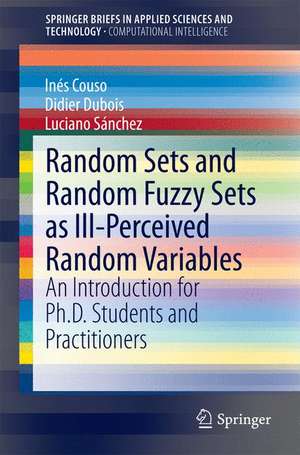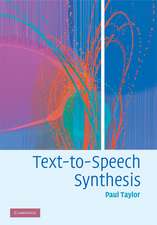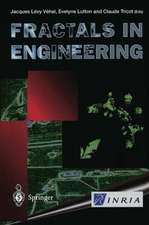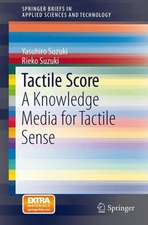Random Sets and Random Fuzzy Sets as Ill-Perceived Random Variables: An Introduction for Ph.D. Students and Practitioners: SpringerBriefs in Applied Sciences and Technology
Autor Inés Couso, Didier Dubois, Luciano Sánchezen Limba Engleză Paperback – aug 2014
Random (fuzzy) sets can be used in many fields ranging from mathematical morphology, economics, artificial intelligence, information processing and statistics per se, especially in areas where the outcomes of random experiments cannot be observed with full precision. This book also emphasizes the link between random sets and fuzzy sets with some techniques related to the theory of imprecise probabilities.
This small book is intended for graduate and doctoral students in mathematics or engineering, but also provides an introduction for other researchers interested in this area. It is written from a theoretical perspective. However, rather than offering a comprehensive formal view of random (fuzzy) sets in this context, it aims to provide a discussion of the meaning of the proposed formal constructions based on many concrete examples and exercises. This book should enable the reader to understand the usefulness of representing and reasoning with incomplete information in statistical tasks. Each chapter ends with a list of exercises.
Din seria SpringerBriefs in Applied Sciences and Technology
-
 Preț: 380.29 lei
Preț: 380.29 lei - 17%
 Preț: 360.34 lei
Preț: 360.34 lei - 20%
 Preț: 386.12 lei
Preț: 386.12 lei -
 Preț: 380.07 lei
Preț: 380.07 lei -
 Preț: 377.95 lei
Preț: 377.95 lei -
 Preț: 382.32 lei
Preț: 382.32 lei -
 Preț: 376.59 lei
Preț: 376.59 lei -
 Preț: 379.09 lei
Preț: 379.09 lei -
 Preț: 378.12 lei
Preț: 378.12 lei - 20%
 Preț: 293.83 lei
Preț: 293.83 lei -
 Preț: 344.90 lei
Preț: 344.90 lei -
 Preț: 321.36 lei
Preț: 321.36 lei -
 Preț: 264.79 lei
Preț: 264.79 lei -
 Preț: 344.90 lei
Preț: 344.90 lei -
 Preț: 356.46 lei
Preț: 356.46 lei -
 Preț: 382.95 lei
Preț: 382.95 lei -
 Preț: 355.66 lei
Preț: 355.66 lei -
 Preț: 479.67 lei
Preț: 479.67 lei -
 Preț: 415.18 lei
Preț: 415.18 lei -
 Preț: 444.52 lei
Preț: 444.52 lei - 20%
 Preț: 301.86 lei
Preț: 301.86 lei -
 Preț: 409.43 lei
Preț: 409.43 lei - 20%
 Preț: 322.17 lei
Preț: 322.17 lei -
 Preț: 355.49 lei
Preț: 355.49 lei - 15%
 Preț: 462.51 lei
Preț: 462.51 lei -
 Preț: 377.18 lei
Preț: 377.18 lei -
 Preț: 355.93 lei
Preț: 355.93 lei -
 Preț: 382.95 lei
Preț: 382.95 lei -
 Preț: 378.12 lei
Preț: 378.12 lei -
 Preț: 378.12 lei
Preț: 378.12 lei -
 Preț: 380.07 lei
Preț: 380.07 lei -
 Preț: 380.07 lei
Preț: 380.07 lei - 20%
 Preț: 326.28 lei
Preț: 326.28 lei -
 Preț: 312.68 lei
Preț: 312.68 lei -
 Preț: 356.43 lei
Preț: 356.43 lei -
 Preț: 412.30 lei
Preț: 412.30 lei - 20%
 Preț: 225.31 lei
Preț: 225.31 lei -
 Preț: 378.12 lei
Preț: 378.12 lei -
 Preț: 376.59 lei
Preț: 376.59 lei -
 Preț: 195.87 lei
Preț: 195.87 lei -
 Preț: 376.22 lei
Preț: 376.22 lei - 20%
 Preț: 324.64 lei
Preț: 324.64 lei - 20%
 Preț: 288.73 lei
Preț: 288.73 lei -
 Preț: 377.57 lei
Preț: 377.57 lei -
 Preț: 261.91 lei
Preț: 261.91 lei -
 Preț: 381.98 lei
Preț: 381.98 lei -
 Preț: 273.64 lei
Preț: 273.64 lei -
 Preț: 410.87 lei
Preț: 410.87 lei -
 Preț: 379.68 lei
Preț: 379.68 lei -
 Preț: 374.30 lei
Preț: 374.30 lei
Preț: 323.14 lei
Preț vechi: 403.92 lei
-20% Nou
Puncte Express: 485
Preț estimativ în valută:
61.84€ • 64.32$ • 51.05£
61.84€ • 64.32$ • 51.05£
Carte tipărită la comandă
Livrare economică 14-28 aprilie
Preluare comenzi: 021 569.72.76
Specificații
ISBN-13: 9783319086101
ISBN-10: 3319086103
Pagini: 97
Ilustrații: VIII, 97 p. 8 illus.
Dimensiuni: 155 x 235 x 10 mm
Greutate: 0.16 kg
Ediția:2014
Editura: Springer International Publishing
Colecția Springer
Seriile SpringerBriefs in Applied Sciences and Technology, SpringerBriefs in Computational Intelligence
Locul publicării:Cham, Switzerland
ISBN-10: 3319086103
Pagini: 97
Ilustrații: VIII, 97 p. 8 illus.
Dimensiuni: 155 x 235 x 10 mm
Greutate: 0.16 kg
Ediția:2014
Editura: Springer International Publishing
Colecția Springer
Seriile SpringerBriefs in Applied Sciences and Technology, SpringerBriefs in Computational Intelligence
Locul publicării:Cham, Switzerland
Public țintă
ResearchCuprins
Introduction.- Random sets as ill-perceived random variables.- Random fuzzy sets as ill-perceived random variables.
Recenzii
“The book under review presents a mathematically based description of the theory of random sets and fuzzy random sets as representations of ill-observed random variables or partially known conditional probabilities. … This publication can be treated as a good introductory textbook for everyone who is interested in the theory of ill-observed random variables.” (Marek T. Malinowski, Mathematical Reviews, November, 2015)
Textul de pe ultima copertă
This short book provides a unified view of the history and theory of random sets and fuzzy random variables, with special emphasis on its use for representing higher-order non-statistical uncertainty about statistical experiments. The authors lay bare the existence of two streams of works using the same mathematical ground, but differing form their use of sets, according to whether they represent objects of interest naturally taking the form of sets, or imprecise knowledge about such objects.
Random (fuzzy) sets can be used in many fields ranging from mathematical morphology, economics, artificial intelligence, information processing and statistics per se, especially in areas where the outcomes of random experiments cannot be observed with full precision. This book also emphasizes the link between random sets and fuzzy sets with some techniques related to the theory of imprecise probabilities.
This small book is intended for graduate and doctoral students in mathematics or engineering, but also provides an introduction for other researchers interested in this area. It is written from a theoretical perspective. However, rather than offering a comprehensive formal view of random (fuzzy) sets in this context, it aims to provide a discussion of the meaning of the proposed formal constructions based on many concrete examples and exercises. This book should enable the reader to understand the usefulness of representing and reasoning with incomplete information in statistical tasks. Each chapter ends with a list of exercises.
Random (fuzzy) sets can be used in many fields ranging from mathematical morphology, economics, artificial intelligence, information processing and statistics per se, especially in areas where the outcomes of random experiments cannot be observed with full precision. This book also emphasizes the link between random sets and fuzzy sets with some techniques related to the theory of imprecise probabilities.
This small book is intended for graduate and doctoral students in mathematics or engineering, but also provides an introduction for other researchers interested in this area. It is written from a theoretical perspective. However, rather than offering a comprehensive formal view of random (fuzzy) sets in this context, it aims to provide a discussion of the meaning of the proposed formal constructions based on many concrete examples and exercises. This book should enable the reader to understand the usefulness of representing and reasoning with incomplete information in statistical tasks. Each chapter ends with a list of exercises.
Caracteristici
Includes supplementary material: sn.pub/extras
















